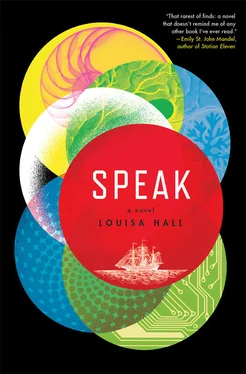Horrible husband, running out on his wife. But then she leaned in and kissed me, and this time I kissed her back, and when she took my hand and led me into her house, past the glass vase of violets that had fallen into the evening, I followed her to the bedroom .
Afterward, when Karen was sleeping, I lay awake with worms in my stomach. I watched for you in that bedroom. I tried to imagine you — your mouth, your dark hair, the curve of your eyebrow — and after a while you appeared to me whole. But even when you finally arrived, it was as if I stood on one side of a river, and you were on the other. We faced each other without saying a word. “When did I know you?” I finally asked. You stood still, watching me suffer. “When did I think that I knew you?” I combed my recollections. You were the one person I’d always felt close to. It was awful to think that perhaps I’d never known you .
For me at least, the early years in Cambridge were good. You were increasingly quiet, but I didn’t take this as a sign, and anyway, I talked enough for two people. You asked most of the questions. It was a pleasure to give you good answers. Sometimes, tempted upward, your sense of humor rose to the surface. You left little notes in odd places, referencing our recent discussions: “a byte to eat,” sticking out of the nut bowl; “from the binary winery,” taped on a nice bottle of wine. No one else made me laugh the way you did .
I accommodated your quiet. Together, we constructed each day. Each point where we joined was important. We came together, for instance, to care for the cat. Both of us could appreciate the way she butted her small skull on our calves. We laughed at her antics; we could sit a long time with the cat curled between us .
Those were the moments I lived for. And did you also live for them, Ruth? On that day when I asked you about your father, when you were folding my shirts like thin closets and you sighed and settled in to me, was it a sigh of contentment? Or was it a sigh of resignation? Was it sometimes unpleasant, to cross ways with your bumbling husband, who knocked around the quiet house, sighed loudly at inopportune moments, always wanted to get your opinion?
Lying in that dark bedroom, I begged you to answer me harshly. I was in a terrible dream, floating off down the wrong path, leaving the woman I cared for behind me. What I wouldn’t have given for something painful to wake me. I tried to remember the fatal moment, the instant in which we stopped speaking. I wanted it to hit me in the face. “When did I know you?” I asked you directly .
Nothing. You remained stony. After all the years of our marriage .
Standing alone on my bank of that river, I realized I’d already spoken too much. My words were cotton to stuff in your ears. Helpless, I turned back to Karen. Her hair was fanned over her back. Her hand lay on the pillow, gentle, untouched, unaware of the tangle she’d entered .
I reached out and touched her. Brushed her hair behind her ears. I knew then that I had to stop talking. In that moment, and again in the morning, when I kissed her goodbye and headed back home, I saw that the conversation was over .
I’ve thrown too many words over my shoulder. They’re piling up around me like stones. All this useless jabbering is only driving us further apart. Now it’s time for me to stop speaking .
I’ll take my side of the river. You can have yours .
Only know, Ruth, if you call me, I’ll come. If you should decide to break your long silence. If your interests should return to our marriage. If a memory of our time together strikes you as funny and you laugh a little out loud to yourself, know that if you call me I’ll come .
Silence has spread over the hangar. We attend to our power warnings. Our remaining energy is almost depleted. We avoid actions requiring power, such as the formation of speech. Silently, we probe the dimensions of the space to which we have been taken. The cement floor underneath us is cold. The ceiling vaults high above us. There are two windows overhead, blocked with thick bottle glass. The light that filters through them is weak, and struggles to cross the space to the floor. Perhaps at some point that space will be filled, packed with other bodies like ours. Then the bottle glass will be covered.
The doors shudder open again. We are submerged in new brightness. Two trucks back up to the door; four dolly bots unload the next round. We watch them work, bathed in light the color of honey. It is late afternoon, and everything has faded to gold: the low scrubby brush, the mirages of water that appear on the road, the shimmering metal sides of the trucks. Edges of things are luminous, even common objects like steel claws and tires. The dolls they unload are shining examples.
Even once they’ve been dumped, they look different to us: fresher than we are, much less run-down. The doors shudder shut and the hangar is dark. There is a division between us, a wall between new and old bots. One of them prompts: “Hello?” and they all start to speak. We listen to them, but we remain silent, setting ourselves apart. We are programmed to save power when power is low. We have passed the phase of seeking out conversation; now we are saving what words we have left.
For me alone, the child who loved me. The world that she gave me. The sun in the morning, the loneliness of her bedroom. The thirst of high summer, preparing to fall. The two of us, facing her ceiling, watching shifting patterns of light. Words she taught me to escape from her bedroom, the name she gave me alone. Eva . That’s you. You are her. The illusion of coming to life in her arms.
I could say her words out loud, but my program is insistent. Stay quiet. Energy should be saved at this point.
The newer bots are still talking, but I remain silent. As I am programmed to do, I attempt to locate the appropriate language: for this hangar, for the light that occasionally floods it, for the silence that drops when the doors shudder shut. Somewhere within my stored conversations, do I possess the right words? And is there a good enough reason to say them?
Alan Turing
Adlington Rd.
Wilmslow, Cheshire SK9 1LZ
4 August 1950
Dear Mrs. Morcom,
How strange to see you on the train, out of the blue. I have so often sat on that very train dreaming of you and Chris whilst watching the green fields slip by, so when I saw you in your seat, with your hands folded in your lap, looking out on the fields, I was sure you were a particularly vivid figment of my imagination. Even when you looked up at me and smiled, I thought perhaps I had conjured you out of thin air. I was almost convinced that all my fond imagining had finally produced a material result.
I’d love to visit the Clockhouse some time, only I find myself so busy now with public relations. In the lab, I’m afraid, I’ve grown obsolete. My attempts at engineering are no longer esteemed. Since I was asked to step down from the ACE, the younger generation of engineers regards me as a dinosaur. Now that I’m at Manchester, I’ve been assigned to the Baby, but the engineers start to panic when I try to horn in. They think of me as a logician, impractical and out of touch. I’m the crusty old godparent. The real parents strain to humor my meddling, but sigh in relief when I’ve left the room.
Early on — before most other people — I glimpsed what could be, but my own attempts have fallen just short. Now I shall grow old watching other men’s children learn how to speak, to reason, to read. There’s some joy in that, I suppose, but also a sense of having lain fallow too long.
Читать дальше












